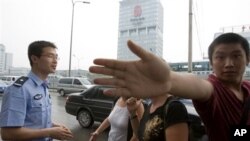BEIJING —
Reporters in China are forbidden from publishing critical reports without the approval of their employer, one of China's top media regulators said on Wednesday.
The rule comes as the government intensifies a crackdown on freedom of expression, both online and in traditional media.
The State Administration of Press, Publication, Radio, Film and Television published the rule in a circular announcing a crackdown on false news and journalists who take bribes or extort money from their sources.
News agencies must crackdown on corruption and journalists who break the law must be handed over to judicial authorities, the regulator said. Journalists who violate the rules will be stripped of their license to report.
Journalists are also forbidden from setting up their own websites, video sites or writing internal reports with critical content, it added. The regulator did not specify what constituted critical content or what particular subjects journalists cannot criticize.
The rules also forbid journalists from conducting interviews or writing reports outside their assigned fields of coverage.
News agencies must regularly solicit opinions from "the masses," as well as propaganda authorities and other media regulators, including itself, it said.
The notice listed several scandals in which Chinese newspaper reporters had reportedly accepted bribes for positive coverage, or forced people to pay them off to avoid a critical story, saying these incidents made the regulation necessary.
Media that violated the rules could be stripped of their licenses, it added.
China adopted tough measures to crack down on online rumors last year, but critics say the campaign is simply a means to target criticism of the ruling Communist Party that has chilled political discourse.
China's news media is heavily censored and media organizations need to obtain licenses from the government before publishing.
State media has been the key vehicle for party propaganda, but reforms over the past decade have allowed greater commercialization and some increase in editorial independence.
The rule comes as the government intensifies a crackdown on freedom of expression, both online and in traditional media.
The State Administration of Press, Publication, Radio, Film and Television published the rule in a circular announcing a crackdown on false news and journalists who take bribes or extort money from their sources.
News agencies must crackdown on corruption and journalists who break the law must be handed over to judicial authorities, the regulator said. Journalists who violate the rules will be stripped of their license to report.
Journalists are also forbidden from setting up their own websites, video sites or writing internal reports with critical content, it added. The regulator did not specify what constituted critical content or what particular subjects journalists cannot criticize.
The rules also forbid journalists from conducting interviews or writing reports outside their assigned fields of coverage.
News agencies must regularly solicit opinions from "the masses," as well as propaganda authorities and other media regulators, including itself, it said.
The notice listed several scandals in which Chinese newspaper reporters had reportedly accepted bribes for positive coverage, or forced people to pay them off to avoid a critical story, saying these incidents made the regulation necessary.
Media that violated the rules could be stripped of their licenses, it added.
China adopted tough measures to crack down on online rumors last year, but critics say the campaign is simply a means to target criticism of the ruling Communist Party that has chilled political discourse.
China's news media is heavily censored and media organizations need to obtain licenses from the government before publishing.
State media has been the key vehicle for party propaganda, but reforms over the past decade have allowed greater commercialization and some increase in editorial independence.









